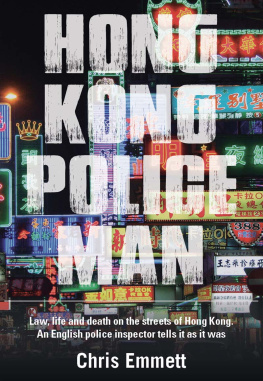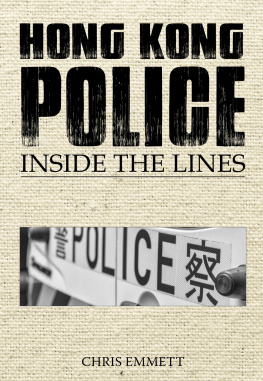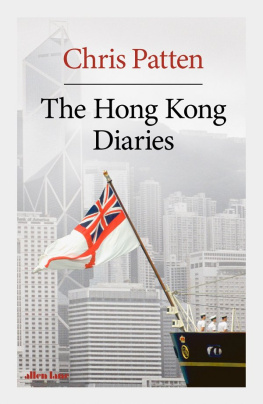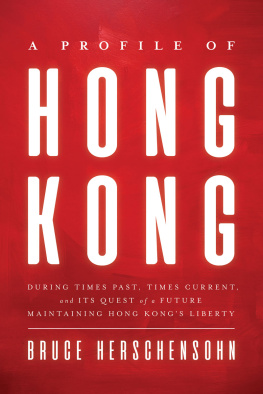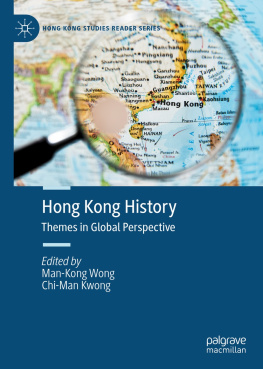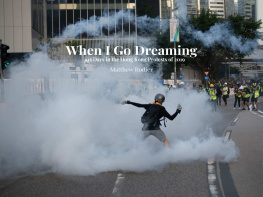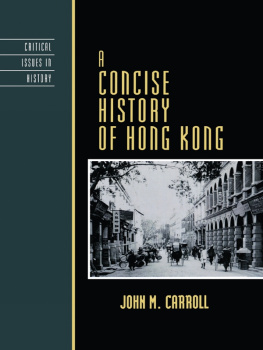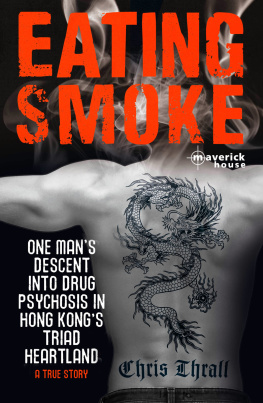Hong Kong Policman
Copyright 2014 Chris Emmett
ISBN-13: 978-988-16090-3-8
All rights reserved. No part of this book may be reproduced in material form, by any means, whether graphic, electronic, mechanical or other, including photocopying or information storage, in whole or in part. May not be used to prepare other publications without written permission from the publisher except in the case of brief quotations embodied in critical articles or reviews. For information contact
Published by Earnshaw Books Ltd (Hong Kong)
For Philip Bruce
ACKNOWLEDGEMENTS
In researching this book I drew on two important works: The Royal Hong Kong Police (1841-1945) by Colin Crisswell and Mike Watson; and Asias Finest by Kevin Sinclair. I also wish to thank those serving Hong Kong police officers who took the time to share with me their personal experiences of how it is to work in todays Hong Kong.
FOREWORD
Cliff Bale, journalist and Hong Kong resident since 1979
A POLICEMANS LOT is not easy, they say. It becomes that much more difficult when an officer from the Merseyside town of Warrington decides to up-stakes and join the police force in distant Hong Kong. This was the case with Chris Emmett in 1970, when he decided he needed a radical change of scenery. He served with the Hong Kong police until his retirement as a senior superintendent in 1998, seeing the city transform from a colony in a diminishing British empire to a special administrative region within the Peoples Republic of China.
This book is based largely on Chris experiences between the time he arrived in Hong Kong until 1977, but there is a section on the historic 1997 handover and his experience attending a banquet hosted by the Chinese Peoples Liberation Army in the former main barracks of the British armed forces close to the Central business district.
With great humour, Chris takes us through his impressions upon arrival in Hong Kong, his first day at the police training school as a probationary inspector and his first encounter with the Wanchai bar scene and its pretty but predatory bar girls.
There are descriptions of his battle to learn Cantonese, his relations as an expatriate officer with his Chinese colleagues - who had intimate knowledge of the crime scene in the rough areas of Hong Kong such as its many public housing estates - and his brush with corruption, not brought under control until the Independent Commission Against Corruption was created in 1974.
Chris details his experiences in the various locations in which he served in the 1970s, including the then new town of Tsuenwan, where he gained his first experiences as an inspector. He was involved in a dramatic rescue at the height of deadly Typhoon Rose, which killed 130 people in 1971. There was also the discovery of a World War II bomb, something that - like typhoons - still happens today.
He also writes about his time in Frontier district, which brought him face to face with the Chinese military in the town of Shautaukok, where the border is an open road called China-England Street - an area still off-limits to most Hong Kong residents and tourists. He details feuds between rival villages in the New Territories that he observed and sometimes played a role in settling.
There are chapters on Chris time with the anti-riot police and on Hong Kong Island, where he was involved in operations involving gambling and drugs and in detective work. He also gets to meet a young Li Kwan-ha, who in 1989 would become Hong Kongs first Chinese commissioner of police. This was an important development as the British colonial government sought to localise the various arms of government, including the police, in the run-up to the 1997 handover. Indeed, in 1994 the government stopped recruiting expatriate police officers, which meant there would be no more Chris Emmetts coming to Hong Kong. In time, as existing overseas officers retire, the force will become entirely Chinese, except for a few locally-born non-Chinese officers.
Today, the lot of the policeman in Hong Kong is becoming more difficult, as the special administrative region becomes more politicised. The police force is accused of siding with the government against protesters, something it denies. But that is another story. This one is about the police force in a colonial Hong Kong, when British and Chinese worked together to keep the peace on the streets of this extraordinary city.
CHAPTER 1
SOME FOREIGN FIELD
I T IS TWO HOURS after dawn and my morning shift has started. The sun is still low but already the cab of the police Landrover is a sweatbox. I open the vents below the windscreen but there is no release from the heat. The back of my bush shirt is damp and my cap feels a size too small. A Colt .38 Police Positive revolver drags at my hip; the stiff leather of my Sam Browne belt bites into my waist. On the Landrovers rear bench, my sergeant is updating the mobile patrol log. The driver turns off the highway and the sergeant curses as we jolt over a pothole.
We roll into the Kwaishek public housing project. Towers of drab concrete surround us, soaring twenty storeys and more. Once, their walls had gleamed white, but now mildew and grime streaks them grey and black. Laundry, drying on poles that poke from the windows, provides a sprinkle of colour. At ground level, practical shops offer hardware, dry goods, stationery, and plywood furniture. Rowdy teahouses serve up dim-sum and pots of treacle-dark, boh-lei tea that bites the tongue. On the street, unlicensed hawkers have set up handcarts laid out with fresh vegetables, stringy meat, fake designer T-shirts, cigarettes, and plastic toys. At the sight of the police Landrover, they shoo away their customers and scatter.
The housing project has a noise unlike anything I have ever known. It is the roar of thousands of people in tight concentration getting ready to face the day. Now, it is time for work; crowds throng the sidewalks. Around the bus station, newspaper vendors and cooked food sellers enjoy frantic trade. Oil bubbles and smokes in flame-blackened woksbalanced dangerously on hissing gas burners. The smells interweave: stewed beef, custard and egg waffles, creamy bean curd. Each arriving bus prompts a jostling, elbowing, cursing scramble to be first to board. Unruly minibuses dart in to poach the bus companys custom and one blocks the road ahead of us. My driver bips the siren and the minibus moves on.
Dai sap-yat joh (Block Eleven), I tell my driver in Cantonese. He nods and we bully our way through crowds that spill onto the road. He stops beside a refuse point, its rank stench filling the Landrovers cabin.
The sergeant calls in a radio check. The radio crackles back at him. Nothing, he snorts. We are in a radio blind spot.
The sergeant and I step out of the Landrover just as the rising sun slices between Blocks Eleven and Twelve. Sweat stings my eyes. I take off my cap and use it to shade my eyes as I scan the upper floors. The sergeant nods to the driver who crunches the Landrover into gear and moves further down the road. We cross a stretch of uneven paving and step into Block Elevens lobby. In the airless gloom, the heat is even more oppressive. A mishmash of noise hits us: shouted conversation, blasting Canto-pop music, televisions running at full volume. The lobby floor is bare concrete. Chipped tiles cover the walls; once they were red but now they are just an anonymous dark hue. There are four lifts, three of them out of order. Corridors stretch left and right. Iron grilles mark the apartments, giving the corridors the look of a third world cellblock. In single rooms measuring twenty feet by twenty feet, families of two, three and four generations live, eat, love, quarrel, and sometimes work. We turn left. Our footsteps ring off the bare concrete. The corridor smells of mould and stale urine. Humidity dampens the walls; water drips from the ceiling and puddles the floor. A child watches us from behind a door grille, her eyes wide, her mouth open and questioning.
Next page
